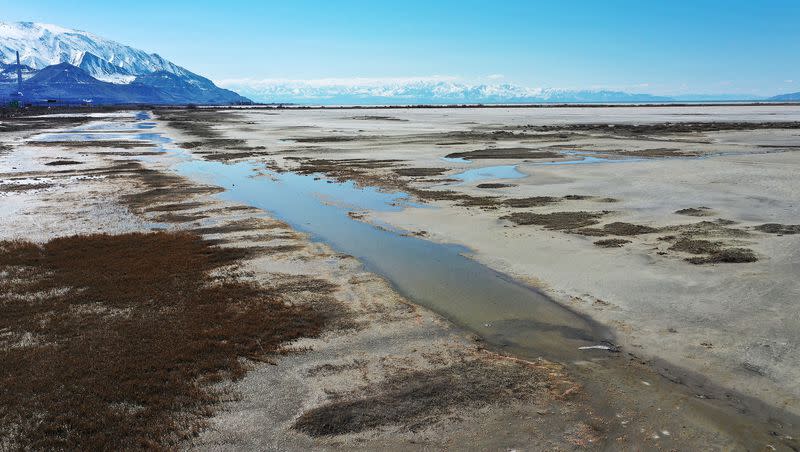Opinion: Doom, gloom, and the Great Salt Lake — why hopelessness can make it worse

Utah Gov. Spencer Cox was right, to a point, when he urged scientists and activists to back off from their “doom and gloom” about the Great Salt Lake last week.
Making the lake’s disappearance seem inevitable might actually lead people to engage in more reckless behavior, figuring they can’t do anything about the problem, anyway, he said. He’s not alone in that assessment.
However, it’s also true that without some doom and gloom — especially the startling conclusion of a recent BYU study that said the lake could disappear in five years without immediate action — state lawmakers and other interests might not be as spurred to action as they are. Sometimes, dire predictions, based on statistics and trends, are exactly what is needed to direct attention toward a matter, much like a doctor’s warning about the inevitable outcome of risky behavior.
And yet, without hope, nothing can be done, and we applaud the governor for pointing it out.
Cox made his comments to a roomful of scientists and activists at the University of Utah’s S.J. Quinney College of Law. He said, “When we tell people that the sky is falling, what most people do is, they give up. ... If the Great Salt Lake is already done, if it’s already dried up, we’re all going to die from toxic dust, then I’m just going to go ahead and water my lawn.”
That’s a bit hyperbolic. People more likely would instead seek to move elsewhere as the impacts gradually become apparent, and economic development would retreat. But his overall assessment is sound.
Related
The governor’s comments nearly coincided with a new report released Monday by the United Nations’ Intergovernmental Panel on Climate Change, which was riddled with its own collection of gloom and doom about the planet, at large. Without immediate action, it said, climate change would threaten everything from ecosystems to livelihoods and personal health and well-being.
“Humanity is on thin ice — and that ice is melting fast,” U.N. Secretary-General Antonio Guterres said. “Our world needs climate action on all fronts — everything, everywhere, all at once.”
Sounds hopeless, doesn’t it?
And yet, only a year ago, scientists told The Associated Press that the climate crisis is not hopeless, despite being faced with similar data.
“We are not through a threshold or past the threshold. There’s no such thing as pass-fail when it comes to the climate crisis,” University of Maine climate scientist Jacquelyn Gill told the AP. “It’s really, really, really hard to walk people back from that ledge.”
In the same report, Wooster College psychology professor Susan Clayton said gloom and doomism is “a way of saying, ‘I don’t have to go to the effort of making changes because there’s nothing I can do anyway.’”
Or as Richard B. McKenzie, economics professor at the University of California, Irvine, wrote for the Cato Institute, this attitude “could cause many people to become fatalists and adopt the Alfred E. Neuman mantra, ‘What, me worry?’ … people will resign themselves to saying: ‘What’s the use? Order me an Escalade, and turbocharge it!’”
We may forget, or fail to notice, the progress being made. As Bruce Beehler wrote in a column for The Washington Post a few years ago, the bald eagle population has gone from near extinction in the 1960s to a thriving level today, just as many forests are healthier than they once were and the air is cleaner in many cities than a few years ago. Gloom and doomers tend to overlook such things, as well as the subtle changes in personal behavior and awareness. All is not hopeless.
Related
Opinion: What would you do if you believed your actions really impacted the environment?
Inside what the Church of Jesus Christ is doing to save water and the Great Salt Lake
Granted, the climate crisis and the future of the Great Salt Lake are two separate topics. But both involve climate and weather, which many people already consider out of their hands. The effects of climate change are much more gradual than the effects of drought on the Great Salt Lake, which means many Utahns may feel especially hopeless by their unique problem.
Except that steps are being taken in that regard, as well. As House Speaker Brad Wilson told the same group of scientists and activists, state lawmakers have appropriated nearly $1 billion toward drought mitigation in the last two years, including $50 million to help agricultural interests modernize, the funding of an effort to meter secondary water, the establishment of a water trust to help manage the lake and the creation of a new commissioner position to oversee all these efforts.
In addition, The Church of Jesus Christ of Latter-Day Saints just announced it is donating more than 5,700 shares it holds in the North Point Consolidated Irrigation Company to the state, which is the equivalent of more than 20,000 acre-feet every year that now will flow directly into the lake.
That type of donation — the result of a public-private partnership — could spur other similar private donations to help the lake.
Add to that a winter of record snowfall in Utah’s mountains, and there is plenty of reason to hope. We agree with Cox that his call for people to pray for an end to the drought contributed to this outcome, and we agree that the combination of faith and honest efforts provides plenty of reasons to hope for a better future.
Yes, Utahns need to be clear-eyed about how dire the situation remains. Decades of drought won’t be erased in one winter. Much more remains to be done. But, above all, they need to have hope that the problem can be solved.

